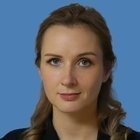At the opening ceremony, Maria Lvova-Belova read out the President’s greetings to the event participants. The President of Russia noted that the mission to protect childhood gains special importance in the Year of the Family and deserves sincere recognition because “it does not only require deep professional knowledge, but also sympathy of heart and compassion.” Maria Lvova-Belova noted that the institution of the Commissioners for Children's Rights pays special attention to supporting large families, families raising children with disabilities, families in difficult life situations, as well as families of participants in the special military operation.
Providing better housing was among the main topics of the congress. Speaking at the plenary session, Maria Lvova-Belova stressed that, for Russian families, living a comfortable life is primarily associated with housing. The development of affordable formats for purchasing one’s own home is an essential condition for the number of families, including large families, to grow in Russia. New infrastructure solutions are required that take into account the needs of young parents, large families, and families raising children with disabilities.
Maria Lvova-Belova noted that the number of appeals related to housing received by the Commissioner’s Office has been growing each year. In 2023, there were 1,872 appeals, including matters concerning better housing, obtaining a land certificate, using maternity (family) capital, and other measures of state support.
National nongovernmental organisations that are members of the Parents’ Platform under the Presidential Commissioner for Children's Rights were presented at the congress. The advisory body set up by Maria Lvova-Belova in 2021 united leading parental organisations, such as the Russian Organisation of Parents of Children with Disabilities; “About Her” International Community of Mothers with Children with Disabilities, which has 42,000 members and more than 1,000 partners; the Union of Families of Russia, which, in addition to other social initiatives, implements the Hero’s Family project, which unites families of the special military operation participants; the Council of Mothers, which has 63 regional offices, and the Union of Fathers, which is represented in 67 Russian regions and implements, among other things, the Dads Against Bullying project in educational organisations.
Other important topics include support for families in crisis and rehabilitation of parents with alcohol or drug addiction. A federal pilot platform for rehabilitation of such parents will open in the Tyumen Region. Specialists will also undergo training and internship there.
Resolution of family disputes was another important area in the work of children’s commissioners. A separate discussion was dedicated to this topic at the congress in order to develop a working algorithm of actions.
The congress was attended by regional children’s commissioners, their offices’ employees, representatives of the legislative branch, federal and regional authorities, and experts on childhood. The delegates visited Tyumen Region organisations and institutions that have innovative experience in working on the topics of the congress.
